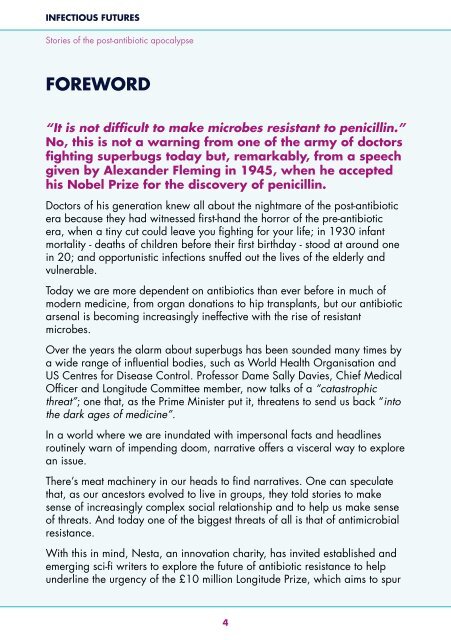FUTURES
infectious-futures
infectious-futures
You also want an ePaper? Increase the reach of your titles
YUMPU automatically turns print PDFs into web optimized ePapers that Google loves.
INFECTIOUS <strong>FUTURES</strong><br />
Stories of the post-antibiotic apocalypse<br />
FOREWORD<br />
“It is not difficult to make microbes resistant to penicillin.”<br />
No, this is not a warning from one of the army of doctors<br />
fighting superbugs today but, remarkably, from a speech<br />
given by Alexander Fleming in 1945, when he accepted<br />
his Nobel Prize for the discovery of penicillin.<br />
Doctors of his generation knew all about the nightmare of the post-antibiotic<br />
era because they had witnessed first-hand the horror of the pre-antibiotic<br />
era, when a tiny cut could leave you fighting for your life; in 1930 infant<br />
mortality - deaths of children before their first birthday - stood at around one<br />
in 20; and opportunistic infections snuffed out the lives of the elderly and<br />
vulnerable.<br />
Today we are more dependent on antibiotics than ever before in much of<br />
modern medicine, from organ donations to hip transplants, but our antibiotic<br />
arsenal is becoming increasingly ineffective with the rise of resistant<br />
microbes.<br />
Over the years the alarm about superbugs has been sounded many times by<br />
a wide range of influential bodies, such as World Health Organisation and<br />
US Centres for Disease Control. Professor Dame Sally Davies, Chief Medical<br />
Officer and Longitude Committee member, now talks of a “catastrophic<br />
threat”; one that, as the Prime Minister put it, threatens to send us back “into<br />
the dark ages of medicine”.<br />
In a world where we are inundated with impersonal facts and headlines<br />
routinely warn of impending doom, narrative offers a visceral way to explore<br />
an issue.<br />
There’s meat machinery in our heads to find narratives. One can speculate<br />
that, as our ancestors evolved to live in groups, they told stories to make<br />
sense of increasingly complex social relationship and to help us make sense<br />
of threats. And today one of the biggest threats of all is that of antimicrobial<br />
resistance.<br />
With this in mind, Nesta, an innovation charity, has invited established and<br />
emerging sci-fi writers to explore the future of antibiotic resistance to help<br />
underline the urgency of the £10 million Longitude Prize, which aims to spur<br />
4


